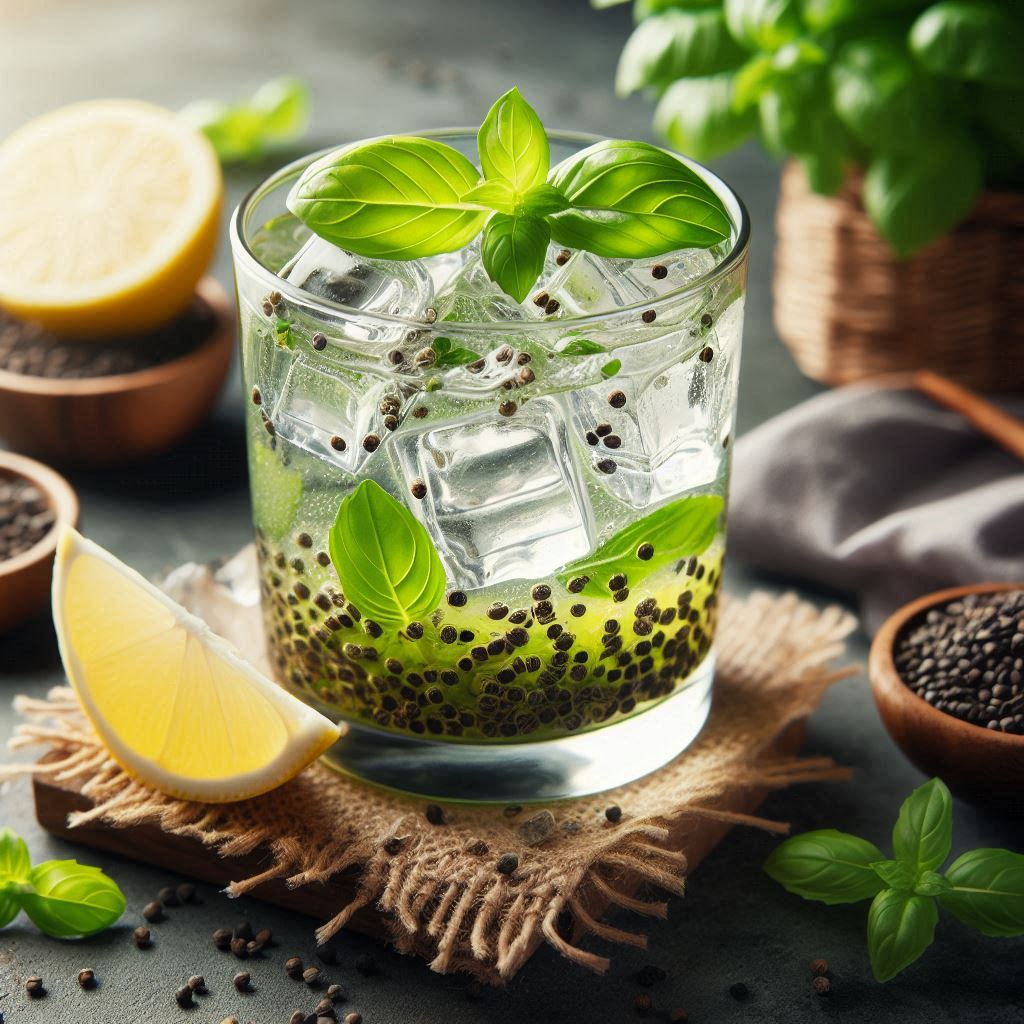What is basil seed drink?

Basil seed drink is a beverage made from soaking basil seeds (also known as sabja seeds) in water or fruit juice. These seeds come from the sweet basil plant (Ocimum basilicum) native to Southeast Asia.
Origins and Cultural Significance
Origins:
- Geographical Origin: Basil seeds originate from the sweet basil plant (Ocimum basilicum), which is native to Southeast Asia, specifically India and Thailand. They have been cultivated and used in these regions for centuries.
- Historical Use: Basil seeds have been documented in traditional Ayurvedic and Chinese medicine practices for their believed health benefits, ranging from digestive aid to cooling properties.
Cultural Significance:
1. Culinary Use: In Asian cuisines, basil seeds are often used as a thickening agent in soups, desserts, and beverages. They are especially popular in drinks like falooda (a South Asian dessert drink) and various regional beverages where they provide texture and nutrition.
2. Cooling Properties: Basil seed drinks are consumed during hot weather in countries like India and Thailand to cool down the body. These drinks are often flavored with rose syrup, lemon juice, or other fruit flavors to enhance their refreshing qualities.

3. Medicinal Uses: In traditional medicine systems like Ayurveda and Traditional Chinese Medicine (TCM), basil seeds are believed to have various health benefits. They are often used to aid digestion, relieve constipation, and promote overall well-being.
4. Religious and Cultural Practices: Basil leaves are also significant in religious rituals and are often used in Hindu ceremonies and offerings. While the seeds themselves are less commonly used in religious practices, the plant holds cultural importance in many Asian societies.
5. Regional Variations: Different regions within Asia may have specific uses and traditions associated with basil seeds. For example, in South Asia, they are integral to the preparation of drinks like falooda, whereas in Southeast Asia, they are used in similar beverages and desserts.
Ingredients
The ingredients for a basic basil seed drink typically include:

- Basil Seeds (Sabja Seeds): These are the main ingredient that gives the drink its characteristic texture when soaked.
- Water or Juice: Used as the base to soak the basil seeds. Plain water, coconut water, or fruit juices like lemonade or orange juice are common choices.
- Sweetener: Often added to taste. This can be sugar, honey, agave syrup, or any other sweetener of choice.
- Flavorings (optional): Ingredients like lemon juice, lime juice, rose syrup, or fruit syrups can be added for additional flavor.
- Ice (optional): Some recipes include ice cubes to make the drink more refreshing, especially in hot weather.
Preparation
Making basil seed drink is quite simple. Basic method for preparation:
Requirements:
- 2 tablespoons basil seeds (sabja seeds)
- 1 cup water (or fruit juice of your choice)
- Sweetener to taste (sugar, honey, agave syrup, etc.)
- Flavorings (optional, such as lemon juice, rose syrup, fruit syrups)
- Ice cubes (optional)
Instructions:
1. Soak the Basil Seeds:
- Place 2 tablespoons of basil seeds in a bowl or glass.
- Add 1 cup of water (or fruit juice) to the bowl.
- Stir well to combine. Let the seeds soak for about 10-15 minutes. During this time, the seeds will swell up and develop a gelatinous outer layer.
2. Sweeten and Flavor:
- After the seeds have soaked and expanded, add sweetener to taste (start with about 1-2 teaspoons of sugar or honey, adjust as needed).
- If using flavorings like lemon juice, rose syrup, or fruit syrups, add them at this stage as well. Stir well to mix everything together.

3. Serve:
- If desired, add ice cubes to a glass.
- Pour the basil seed mixture over the ice cubes (if using).
- Stir once more before serving to ensure everything is well combined.
Nutritional Benefits
Basil seeds, also known as sabja seeds or tukmaria, offer several nutritional benefits:
1. Dietary Fiber: Basil seeds are rich in dietary fiber, which is important for digestive health. Constipation is avoided, regular bowel movements are encouraged, and general gut health is supported by fiber.
2. Vitamins and Minerals: Basil seeds contain various vitamins and minerals, including vitamin K, which is essential for blood clotting and bone health, and minerals like calcium, magnesium, and iron.
3. Antioxidants: These seeds contain antioxidants such as flavonoids and polyphenols, which help protect cells from damage caused by free radicals. Antioxidants may have anti-inflammatory qualities in addition to being beneficial to general health.
4. Omega-3 Fatty Acids: Basil seeds are a plant-based source of omega-3 fatty acids, specifically alpha-linolenic acid (ALA). Omega-3 fatty acids are beneficial for heart health and have anti-inflammatory effects.
5. Low in Calories: Basil seeds are low in calories but high in nutritional value, making them a healthy addition to a balanced diet, especially for those watching their calorie intake.
6. Hydration: When soaked in water or juice, basil seeds develop a gelatinous coating due to their mucilage content. This property helps keep the body hydrated and can be particularly refreshing during hot weather.
7. Potential Blood Sugar Regulation: Some research suggests that basil seeds may help regulate blood sugar levels, although more studies are needed to confirm this benefit. They may potentially slow down the conversion of carbohydrates into sugar.
8. Weight Management: The fiber content in basil seeds can promote a feeling of fullness and satiety, which may help in controlling appetite and managing weight.
Benefits
Basil seed drink, often made from soaking basil seeds (sabja seeds) in water or juice, is believed to offer several potential health benefits:
1. Hydration: Basil seeds are hydrophilic, meaning they absorb water and swell up when soaked. Drinking basil seed drink can help hydrate the body, especially in hot weather.
2. Digestive Aid: Basil seeds are rich in dietary fiber, which can aid digestion and promote regular bowel movements. This may help relieve constipation and improve overall digestive health.
3. Cooling Effect: In many Asian cultures, basil seed drink is consumed during hot weather to cool down the body and reduce heat-related discomfort.
4. Nutrient Content: Basil seeds contain essential nutrients such as vitamins (like vitamin K), minerals (like calcium and magnesium), and antioxidants, which contribute to overall health and well-being.
5. Weight Management: The fiber in basil seeds can contribute to a feeling of fullness and satiety, potentially aiding in weight management by reducing overall food intake.

6. Potential Anti-inflammatory Properties: Some studies suggest that basil seeds may have anti-inflammatory properties due to their antioxidant content, which could benefit overall health.
7. Blood Sugar Control: There is some evidence to suggest that basil seeds may help regulate blood sugar levels, although more research is needed in this area.
8. Skin Health: The antioxidants in basil seeds may contribute to healthy skin by fighting free radicals and promoting youthful-looking skin.
Side effects
While basil seed drink is generally safe for most people when consumed in moderation, there are a few considerations regarding potential side effects:
1. Choking Hazard: Basil seeds swell up and develop a gelatinous coating when soaked in water or juice. If not soaked adequately or consumed without enough liquid, there is a risk of choking, especially in children or elderly individuals. It’s crucial to ensure the seeds are fully hydrated and consumed with plenty of liquid.
2. Allergic Reactions: Some individuals may be allergic to basil seeds or may experience allergic reactions, especially if they have a known allergy to plants in the Lamiaceae family, which includes basil. It can lead to an allergic reaction which may include itching, swelling, rash, or difficulty breathing.

3. Digestive Issues: While basil seeds are rich in fiber and can aid digestion for most people, consuming too much fiber at once may cause bloating, gas, or abdominal discomfort in some individuals, especially if they are not used to a high-fiber diet.
4. Interactions with Medications: If you are taking medications, particularly blood thinners or medications for diabetes, talk to your healthcare provider before consuming basil seed drink regularly. Basil seeds may have mild blood-thinning effects and could potentially interact with diabetes medications, affecting blood sugar levels.
5. Pregnancy and Breastfeeding: There is limited research on the safety of basil seed drink during pregnancy and breastfeeding. It’s best to consult with a healthcare provider before consuming it regularly if you are pregnant or nursing.
6. Quality and Contamination: Ensure that the basil seeds used are of good quality and free from contaminants. Poor-quality seeds or seeds that have been improperly stored may pose a risk of microbial contamination.

FAQ (frequently asked questions)
1. What are basil seeds?
- Sabja seeds, frequently referred to as tukmaria or basil seeds, are from the sweet basil plant (Ocimum basilicum). They are small, black seeds that swell up and develop a gelatinous coating when soaked in water or juice.
2. How do you prepare basil seed drink?
- To prepare basil seed drink, soak 2 tablespoons of basil seeds in 1 cup of water or juice for about 10-15 minutes until they swell up. Add sweetener to taste (such as sugar, honey, or agave syrup) and any desired flavorings (like lemon juice or fruit syrups). Stir well and serve chilled.
3. What does basil seed drink taste like?
- Basil seed drink is mild and neutral in flavor. The seeds themselves don’t add much flavor but rather a unique texture. The taste can be enhanced with sweeteners and flavorings added during preparation.
4. What are the health benefits of basil seed drink?
- Basil seed drink is believed to offer benefits such as hydration, digestive aid, cooling effect, nutrient content (like vitamins and minerals), potential weight management support, and possible anti-inflammatory properties.
5. Are there any side effects of drinking basil seed drink?
- Potential side effects include choking if not consumed with enough liquid, allergic reactions in sensitive individuals, digestive discomfort from excess fiber, possible interactions with medications, and concerns during pregnancy or breastfeeding.
6. Is basil seed drink suitable for everyone?
- Basil seed drink is generally safe for most people when consumed in moderation. However, individuals with allergies to basil or other plants in the Lamiaceae family, those on medications, pregnant or breastfeeding women, and young children should exercise caution and consult with a healthcare provider if unsure.
7. Can basil seeds help with weight loss?
- The fiber content in basil seeds may contribute to a feeling of fullness and satiety, potentially aiding in weight management by reducing overall food intake. However, more research is needed to confirm this effect in future.
8. Where can I buy basil seeds?
- Basil seeds are commonly available at grocery stores, health food stores, and online retailers. Look for organic and food-grade seeds for the best quality.
9. How should basil seeds be stored?
- Store basil seeds in a cool, dry place in an airtight container to maintain freshness. Proper storage helps prevent contamination and ensures the seeds remain viable for use in drinks and other recipes.
10. Can I use basil seeds in other recipes besides drinks?
- Yes, basil seeds can be used in various culinary applications. They are often added to desserts, puddings, smoothies, and even salads for their nutritional benefits and unique texture.
Conclusion
Basil seed drink is more than just a trendy beverage; it’s a nutritious addition to your diet that offers hydration, fiber, and antioxidants in a delicious package. Whether you’re looking to cool off on a hot day or incorporate more natural remedies into your wellness routine, basil seed drinks provide a refreshing and healthful option. With its versatility and nutritional benefits, this drink deserves a place in everyone’s kitchen. Embrace the goodness of basil seeds and savor the blend of tradition and health in every sip. Cheers to your health and well-being!
Table of Contents
Read more about Basil seed drink
Go and visit dusearchit.in and get more knowledge about others topics.
